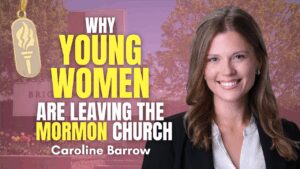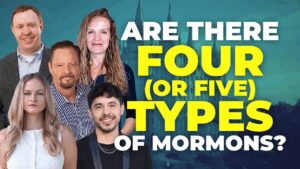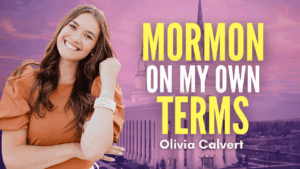Margaret Merrill Toscano is one of the most prominent and controversial feminists in the LDS church. In these episodes we discuss her early years growing up in Arizona as a faithful but questioning Latter-Day Saint, including her time at BYU as a student. We also discuss her journey into both Mormon Studies and Mormon Feminism.
Part 1:
Part 2:
Part 3:
Part 4:
Part 1
Part 2
Part 3
Part 4




12 Responses
John, Thank you for giving Margaret a chance to tell her own story here. Margaret remembers the church she grew up in much same way as I do– sad to me that it is gone. And, do you know that in the audio only version, your voice is really hard to hear?
Thanks, Paula. Yeah…I was hoping my low voice wasn’t gonna be much of an issue. It’s ripped from the video, and only she was mic’d.
Is it “good enough”?
I’m going to listen to this right now. Thanks John! Margaret is one of my absolute favorite LDS thinkers/writers. Don’t wait too long for the next part to come out.
John, it’s probably good enough if you’re listening with headphones, and not doing anything else, but I just sat my laptop on the counter while I was cooking, so it was kind of hard to hear you– but I think it will do.
The sound on the headphones was good – no problems here.
Wow, that was really amazing! I’m sitting here tearing up as I listen. I had the same experience, the same deliverance from depression and self-loathing. I don’t know what to say but just thanks for this interview. Thanks to Margaret Toscano for sharing that with us.
Margaret’s story is so similar to my own, from the realization that the church’s “formula for happiness” isn’t working, to the depression, to the surrender to God, and to the intense spiritual experience that forever changed me. Thank you so much for sharing this!
I listened to this podcast last night and it was a transformative experience for me. My only previous encounter with Margaret was listening to her remarks on the PBS documentary. To be honest, before this podcast I didn’t have the highest opinion of Margaret. I didn’t feel like there was a very Christlike tone behind a lot of her comments on the PBS show; I felt like she was bitter, whiney, and overly critical (get the irony?).
I am very thankful for this podcast because it presented a much deeper picture of Margaret than I saw on the PBS show. I appreciated her honesty in telling about her growing up years. Her struggles. Her imperfections. Her spiritual journey. I found myself identifying with her and feeling a common bond. I stopped looking at her as a bitter whiner and saw her as a sister that I cared about.
I was especially touched by her account of how the Book of Mormon transformed her life, guided her to a “Born Again” experience, and helped her feel God’s overwhelming love. I was struck by the almost identical parallels in my own experience, and now I feel a close kinship with Margaret because I feel like we’ve shared very similar experiences.
I don’t know any details about why Margaret received Church discipline, but I hope my sister Margaret can find a home in the Church in full fellowship and I for one will have wide open arms to receive her.
I too, had an experience with depression almost equal to Margaret’s. I take issue with the idea that “the church” and what she learned there was wrong and what she experienced was right. What she experienced was genuine revelation and experience with God. Words fail it. Rote sunday school fails it. It has to be experienced. I see my experience as deepening my belief in both Christ and his church. I think of it as a graduation and realization that allowed to cast off some incorrect baggage I had acquired. The misconceptions were mine (and maybe some of my fellow ward members.) I do not believe they were “The Church” or its teachings.
Doc, Amen to that. It seems to me that Christ is as guilty as the Church for urging us to strive for perfection. I don’t blame the Church for helping me recognize my faults. We have to recognize our own personal Fall in order to experience the joy of our Redemption. I am thankful that Christ and His Church have helped me recognize both my Fall as well as my Redemption.
after the comments, i thought i would give this a listen. agree that the testimony of the book of mormon and the ‘born again’ experience were cool. but the contempt for the church and commandments were thick. not cool & sad. doc kindly summarized where she missed the mark. the church is designed to bring us to continually feel the love she felt, and the trick is realizing that it’s our misunderstanding, not the church, that causes the overzealous guilt (part of the journey, thouh, no?). i hope someday she realizes what she is missing. finding that joy she felt is what the church, the commandments, the ordinances are all about.
Part4 minute 5 – 8: Applauding Margaret Toscano because power always rests on the acquiescence of the subject. Margaret did not cave in. In this example of coercion the threat of “excommunication” is made attempting to compel Margaret’s silence. The person being coerced still has and must make use of “free will.” Even if one believes that the choice is between hell and some alternative (e.g. keep your mouth shut), this is still a choice, [albeit coercive]. Call it Hobbes’ choice because Thomas Hobbes believed human behavior is deterministic. It is not really a “free choice” at all. With courage like Margaret demonstrated, one may exercise “free will” by rejecting the coercion, by calling the coercer’s bluff or by fighting back. Although the probability of a successful outcome may be low, disobedience to the one(s) making the threat is an adult’s innate “free will.” However, it’s not “free choice” because it’s made under duress. Free will and free choice are different.
Hobbes’ choice above (free will) is being wrongly redefined in the Mormon Church today as “free choice” synonymous with “free agency.” Margaret is hearing church members repeat their mistaken indoctrination, “You are free to choose to obey, to live the commandments, to follow the brethren, or to suffer the consequences. You are free to choose. That is your free agency.” (Not meaning natural consequences, but consequences imposed by church officers.) However, this Rhetorical sleight of hand wrongly defines the compulsion of Hobbes’ choice (free will), as free choice.